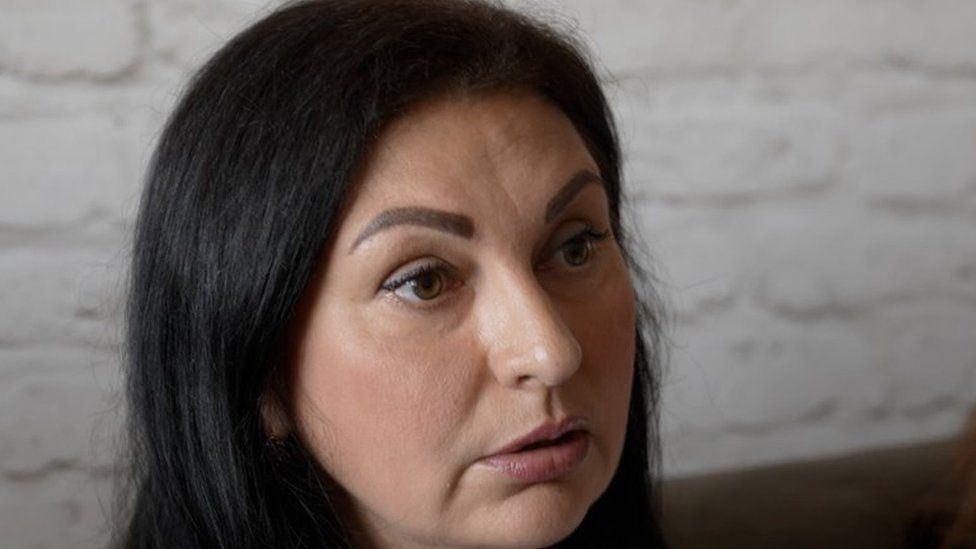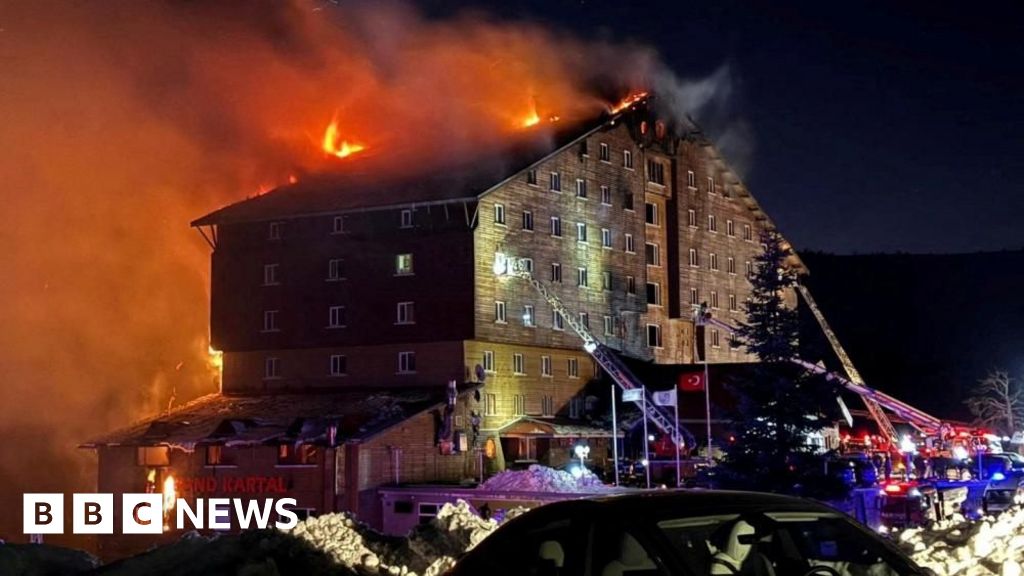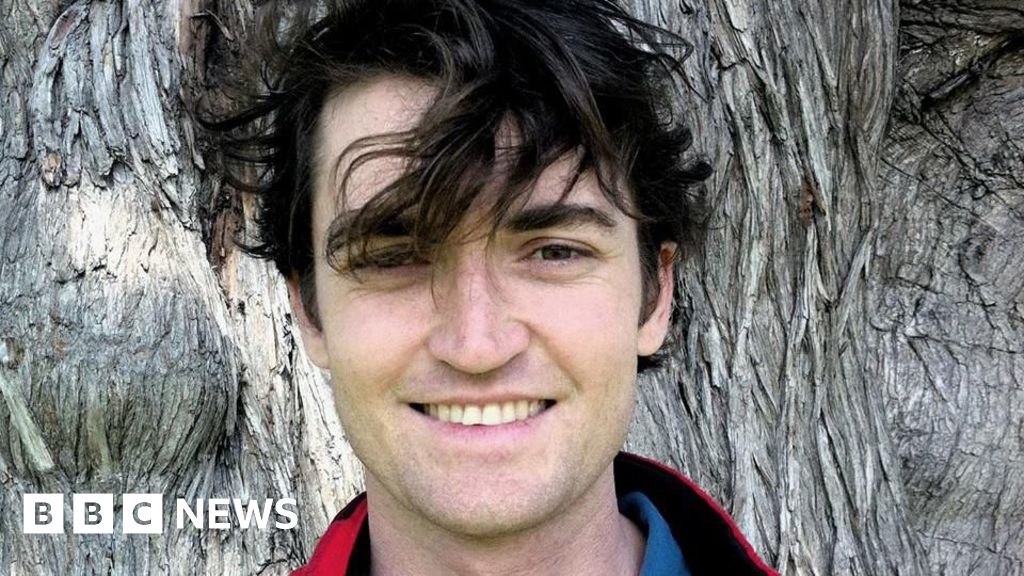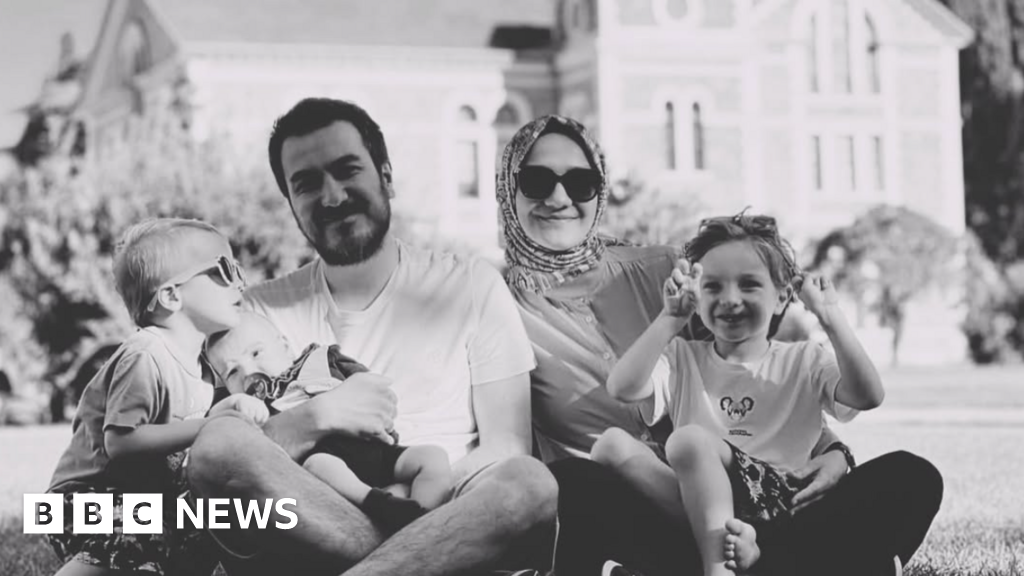ARTICLE AD BOX
By Nick Beake
Europe correspondent, Kyiv

Yuliya Zolotariova managed to flee Mariupol two weeks ago with the help of her daughter Anastasiya.
The true extent of the horror in the Russian-occupied city of Mariupol is hard to uncover.
The details that have already seeped out are difficult to process.
"Dead bodies everywhere. People were lying near every house. No one took them away," Yuliya Zolotariova, 51, tells us as her eyes water.
Now in the relative safety of the capital, Kyiv, she gives a harrowing account of life in her home city where it's a feared a major cholera outbreak could be imminent.
Yuliya escaped just two weeks ago.
"Everything is lost for everyone. Hopelessness. Fear. Pain."
Tears now begin to stream down her face.
"Almost every family has lost someone close to them."
It's easy to see why both Ukrainian officials and international humanitarian agencies believe conditions are perfect for the rapid spread of disease in Mariupol.
"No one has taken out the rubbish since the beginning of the war."
Yuliya explains that clean drinking water was impossible to find for many of the estimated 100,000 people still living in her city.
"We drained and drank water from the boiler. From heating systems. Later, our men went to a destroyed swimming pool and took chlorinated water from there. It's all we had."
The reality of life - or rather existence - under Russian occupation is at jarring odds with the propaganda on prominent display in Mariupol.
Blasted into submission, it's now forced to celebrate its Russian takeover.
The most symbolic moment of subjugation came this past weekend when the occupiers painted over the Soviet-era concrete welcome sign at the entrance to the city.
The freshly daubed colours of the Russian flag masking the blue and yellow of Ukraine.
While Moscow tries to airbrush history, it offers a future of misery to the residents it falsely claims to have liberated.
"Russia is here forever" declares a newly installed giant billboard.
That Yuliya Zolotariova was able to escape this hellhole is down to her daughter Anastasiya who, from afar, provided her with information about a possible escape route.
Yuliya with daughter Anastasiya reunited in Kyiv
The 26-year-old moved to the capital a year ago to build a career working at Ukraine's national railway.
Since the war, she'd been trying to rebuild her family.
But that will be impossible.
Because not only did the Russians destroy her family home, they killed her grandmother Valentyna.
"In fact, they have destroyed three generations," Anastasiya tells us with anger and sadness. "All this, because they think we Ukrainians shouldn't exist."
We ask how many people she knows have been killed since the invasion in February.
"Twenty people I knew personally," she replies.
But the death of her beloved grandma is the hardest to bear.
Anastasiya's grandparents in Mariupol in 1970
Valentyna Polishuk, 80, died on 21 March. Nearly three months on, her body hasn't been recovered.
And it probably never will be.
Valentyna's daughter Yuliya - Anastasiya's mum - recalls the terrifying moment the Russians hit the family's apartment block in the middle of the night.
"I thought there was an earthquake because everything was trembling. The floors, the walls. Everything fell. I thought we were all just going to die."
She says the missile totally destroyed the top three floors and then fire spread through the rest of the building.
"It was insanely scary. We went down to the basement but it was burning badly and there was very strong smoke."
She says it soon became impossible to breathe.
"I said to my mother: 'Mum, let's go to breathe for five minutes. Let's get out of the cellar. She refused because she was very tired. She was 80 years old and it was too hard for her."
Yuliya left her phones and the family's ID documents with her mother and told her she'd go to find help.
"As I came up, the basement collapsed. There was no way to save them. It was hell."
Eleven residents of the block, including children, perished in the basement.
Mariupol's survivors trying to cope with the death and destruction through group therapy.
Now, in another basement in another city, Mariupol's survivors are trying to cope with the death and destruction visited upon them.
In the centre of Kyiv we find men and women standing in a circle passing a ball to one another and exchanging hugs.
This is group therapy for a community that is not only displaced, but traumatised.
Today's session is for those who've revealed they're especially worried about how to make ends meet.
Yesterday's session focussed on bereavement as nearly all of the 20 participants had lost loved ones in the past three months, reveals psychologist Anna Chasovnykova.
"First people come with panic attacks. They remember what was there, and those were explosions and murders. They see all the evil that the Russian Federation has brought to Ukraine."
She must be one of the busiest women in Kyiv, such is the demand for mental health support.
"Almost every Ukrainian faces some psychological consequences. Someone saw the war, someone was in battle, someone lost a family."
The centre where Anna works was only set up a fortnight ago.
In that time, they've supported more than 5,000 people, all of them recently arrived from Mariupol.
In another room, we see Mykola Polishuk, 79, registering his details and recording the life he lived in his beloved Mariupol: his address, his job, his family.
Mykola Polishuk with daughter Yuliya and granddaughter Anastasiya
But there will be a line missing in the record.
He is the husband of Valentyna.
"I'm sorry, I can't talk because the tears are coming."
Mykola puts his head in his hands and covers his face.
In front of him there's a photo of his wedding day - in Mariupol - in 1970.
It's one of the very few things his family still possess.
His face is drained of all remaining colour, as he contemplates the new existence Russian President Vladimir Putin's invasion has created for him.
"What they have done сan never be forgiven."

 2 years ago
81
2 years ago
81








 English (US) ·
English (US) ·